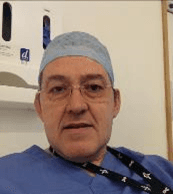But all that was years ago and I have been well, apart from a less serious relapse which led to me taking antidepressants for life. I have now been completely well for the best part of ten years. That is - well in terms of my mental health.
Delay in diagnosis of appendicitis due to mental health history
Unfortunately, physically I haven’t been so lucky. I have needed various surgeries and medical treatment completely unrelated to my previous psychiatric history. Take for example the time when I suffered from an acute appendicitis. So, having had classic crampy abdominal pain for 36 hours, I am then woken suddenly at 03.00 am with severe right sided lower abdominal pain. By morning, I manage to get an emergency appointment with my General Practitioner (GP). Well, I say my GP, but the truth is that he is a GP at the practice where I am registered and I think it’s no coincidence that he is available. He is always available and perhaps here’s why. So, I come in and explain my symptoms and as if by magic, his first thought is “Could this be a touch of Irritable bowel?” Well, I know someone put this diagnosis on my notes nearly thirty years ago when I had diarrhoea for several months. The fact that it all cleared up and I had none of the other symptoms, not have I ever complained of anything similar since, rather suggests to me, that this was an inaccurate diagnosis.
But of course, why consider something physical in a 55 year old who has had a past history of depression? Despite doing my best to avoid having to go to Accident & Emergency (A&E) where I was working, by the time I drove home, I realised that I was not going to be able to drive any more that day. I waited until my husband got home from work, which meant a call to the out-of-hours service. Unfortunately, they wouldn’t see me, so I ended up being admitted from A&E. I was septic by the time I had my appendectomy the following day, but no further mention of my past history had been made or so I thought.
Medical record error correction – or not
I
have a scar from a mini abdominoplasty performed several years after the dreadful depression from 1994-2001, when I was in a psychotic state and repeatedly cut myself. The procedure was to remove scar tissue that had become problematic after my self-mutilation. I almost bled to death from one of those episodes, so being the fool that I am, when asked by the surgical Foundation Year 2 doctor why I had the scar, I told the truth. I find out several weeks later that she has requested a CT scan stating I have a ‘self-inflicted wound’. This request is seen by those who I work with on a daily basis and not only is it totally untrue – I have a scar from an abdominoplasty- but it is there, indelible on my record. I tried to get it changed, but it cannot be deleted – a note was put that this was false, eventually, but only after I persisted, having first been threatened with the possibility of disciplinary action for viewing my own CT scan!
Sjögren's syndrome / anxiety – discuss!
I had the misfortune to meet the same GP over a year later, this time when I had been referred to him, from my dentist suspecting Sjögren's syndrome. I have dry eyes, mouth ulcers and sores as a result of the dry mouth and his diagnosis this time is anxiety, because he gets a dry mouth when he’s anxious! I have to instruct him on what blood tests need to be requested. There follows a whole series of consultations with maxillofacial surgery for a biopsy and rheumatology. I also contact the psychiatrist who I was seeing to get him to put in writing that my symptoms are not psychogenic. He also asks if they would please do the decent thing and do proper investigations. It all ended badly, with a doctor being incredibly rude to me. My complaint is dealt with in a similar incompetent manner and seven months later, I receive the answer to it, where the doctor in question has fabricated a story accusing me of forcing her to do the biopsy. Of course, the whole tone of the letter is far from apologetic. Instead, I feel as if I did something wrong by just being a patient. By the time I received this, I am in the USA, having emigrated to Denver, Colorado. Thankfully here no one has questioned the validity of my symptoms and I am receiving appropriate treatment for Sjögren's syndrome, but at a cost!
Practising as a doctor with a mental health history in the USA
Sadly, though the US also takes a dim view of those who have had mental health problems. You can be refused entry to the country if you have self-harmed in the past and are deemed likely to repeat this in the future. While studying for the United States Medical Licensing Exam (USMLE), I found out that if you are suffering from depression and see a doctor when you are working, you have no right of confidentiality and you are not allowed to work, regardless of whether or not you are performing well or have no potential safety issues………………Apparently, in Texas, you will not be able to gain a licence to practice at all, if you have had a history of mental health problems.
Of course, my attempt to get life insurance a few years ago when I was still working in the UK was also thwarted. My GP stated that although I had been well for years, in the past I had self-harmed on multiple occasions – it was true, but that’s it – my life wouldn’t be covered if I committed suicide – well of course not, but in fact my life cannot be covered at all. It was refused and that’s the end of it!
Future plans
This sounds rather depressing, doesn’t it? There is still a long way to go to eliminate not only the stigma of current mental illness, but also of the past. It does fill me with sadness and it also makes me feel angry. But I don’t want to become bitter and unforgiving. While I worked in A&E until August last year, I did my utmost to be open about myself and to educate my colleagues. We are whole people, the mind and body are not separate entities and we all deserve respect and care regardless of our past or present symptoms, or what brought them about. But changing attitudes takes more time than I first thought.
I have not pursued the complaint. It devoured emotional energy and although the head of the complaints department suggested that I enlist the help of a solicitor, it is not such an easy thing to do from here. But I am in two minds. Will the NHS only listen if litigation occurs? If so then maybe it’s worth it, but I don’t want to deprive an already overstretched system of precious resources. At the same time, it does worry me. I am articulate and a doctor and this happens to me, so what about those who are less able to speak for themselves? Sadly, I am increasingly of the mind that I should record consultations, because for some reason, I seem to be the loser when it comes down to who said what. From a legal point of view, a patient is at liberty to do so, even if they do not divulge the information. From a doctor’s stance, I think it would be good if everyone assumed that whatever we say was being recorded. It may just help the vulnerable to not be taken advantage of.
I hate to admit it, but I am still vulnerable as a result of what happened to me in the past. None of it was my fault, I never chose to be ill and I did my best to get free from it. Unfortunately, it follows me, but now, as much as ever, I wish to put the experience to good use to help others. I am far from perfect, but I hope that someone, somewhere will give me a chance. At present, I remain unemployed, hoping, looking and waiting for opportunities here in the USA.
Pray or wish me luck, it looks like I need it!
Dr Cathy Wield
Author of Life After Darkness: a doctor’s journey through severe depression
2006 and A Thorn In My Mind: mental illness, stigma and the church
2012







